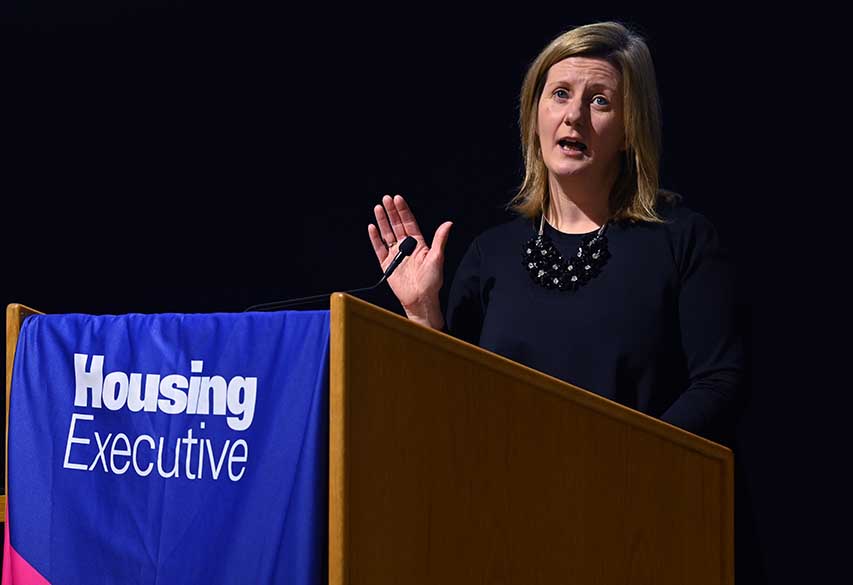Housing Executive strategy zeros-in to eliminate carbon
As it moves towards its target of producing net zero carbon emissions by 2050, The Housing Executive today (Tuesday, November 8) launched its Corporate Sustainable Development Strategy and Action Plan (2022-2027).
A framework for helping tackle the climate emergency, the new strategy outlines the organisation’s commitment to sustaining our environment for future generations and providing quality, affordable housing.
Over the next five years, the strategic housing authority has committed to improving its social and environmental impact while addressing the cost of living crisis.
Strategic sustainable development targets include:
- A 6% reduction in carbon emissions by 2026
- As a landlord, retrofit housing to increase energy efficiency by 2030, plus a 23% reduction in carbon emissions up to 2030/31
- A corporate 25% reduction in carbon emissions by 2030/31

Key strategic actions include improving the organisation’s built environment, supporting biodiversity, assisting sustainable communities and promoting sustainable transport.
Educational empowerment leading to behaviour change is essential, and improved health and wellbeing outcomes through more sustainable living is also a key focus for change.
Housing Executive Chief Executive Grainia Long said: “Alarm bells about climate change and soaring wholesale energy prices have brought the urgency of the climate and energy crisis into sharp focus.
“Our housing sector faces a huge challenge.
“Northern Ireland has reduced greenhouse gas emissions by 24% since 1990 but much more needs to be done.
“We recognise the need to decarbonise the built environment and we are determined to influence future best practice through innovation and collaboration.
“In this strategy we have put sustainability at our core, meaning we want to transform everything we do with an intent and urgency on the need to decarbonise our stock, improve energy efficiency, support the building of low-carbon homes and decarbonise our fleet,” she said.
“The funding and scaling up of implementing energy efficiency measures across Northern Ireland is urgently required across all tenures, not just social housing, and we have a great opportunity to do this on a cross-governmental basis.
“We know that 14% of greenhouse gases come from the residential sector and, in our unique role as Northern Ireland’s largest landlord and its Home Energy Conservation Authority, we must play a leading role in reducing greenhouse gas.
“To achieve net zero, we need to work with government and other partners to insulate homes and replace fossil fuel heating systems with ‘clean heat’ technologies, such as heat pumps and heat networks.
“We will also encourage other housing providers to do the same,” Grainia added.
The Chief Executive said that decarbonising Northern Ireland’s housing stock was not only an essential part of tackling the climate emergency, it also combated fuel poverty, stimulated the economy, created jobs, provided warmer homes and cleaner air and supported biodiversity.
“Last year we invested £35m specifically on energy efficiency improvement measures within both Landlord and Regional Services.
“This investment includes the rolling out of one of the largest retrofit programmes across the UK, which will see vast improvements in the energy performance of almost 2,000 of our homes.
“It includes improving thermal efficiency in aluminium bungalows and ‘no fines’ dwellings through the provision of new external wall cladding, new double glazing, improved ventilation and loft insulation,” she continued.
“At the core of the programmes is a range of innovative technologies to address the impact of climate change and improve sustainability.
“Taking a ‘fabric first’ approach to the decarbonisation of homes, and delivering at scale in this decade, presents a once in a generation opportunity to improve housing standards, reduce energy costs of households and create jobs.
“However, achieving our ambitions will require very significant investment in energy efficiency measures, the funding for which will not be available under our current funding regime.
“Consequently our 2030/31 targets for our housing stock will be reviewed as the issues of funding, technology and sector capacity become more clear towards the end of our initial five year action plan period.”
The Housing Executive would like to thank all our stakeholders from across the residential sector, and in particular Sustainable NI who supported our strategy development.
The Housing Executive’s modest short-term target of a 6% reduction in carbon emissions up to 2025/26 represents the first step on a pathway to reaching a position of net zero carbon across tenants’ homes.
“It is considered achievable given the anticipated funding position over the next 3 years and other stock improvement and maintenance obligations and priorities.
It will be delivered through our current thermal improvement programmes (primarily heating, loft insulation, double-glazing, a minor cavity wall insulation programme and the completion of a limited external wall insulation programme).
TARGETS
WASTE
We will achieve 60% recycling on our office estate by 2030 in line with the Northern Ireland municipal recycling target.
NATURE
We will promote habitat creation, biodiversity and carbon sequestration by planting 7,000 trees per year (Corporate Plan Target)
FUEL POVERTY
We will support a range of fuel poverty measures across our existing housing, deliver the Department for Communities’ private sector grants programmes and provide energy advice across both public and private sector housing.
GENDER EQUALITY
We will ensure a highly valued, engaged, performance and customer orientated workforce, which is representative of our community, and an environment of dignity and respect and health and well-being, where all employees are enabled to reach their potential and be recognised for their individual contributions.

























